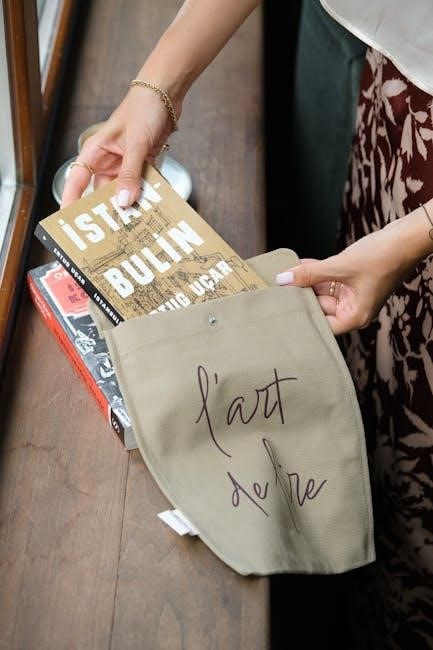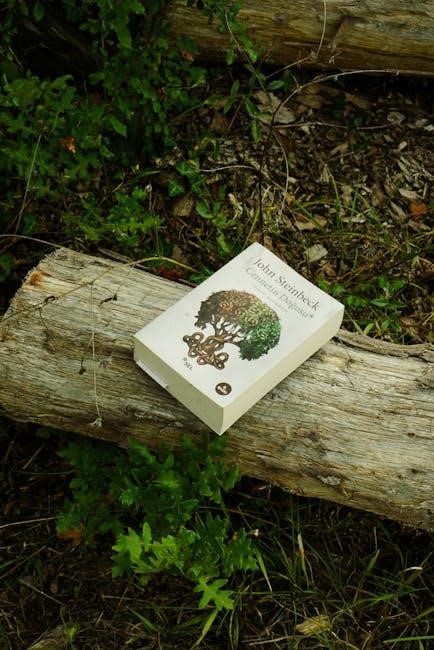The Book Thief by Markus Zusak is a poignant novel set in Nazi Germany during World War II, narrated by Death․ It explores themes of mortality, humanity, and the power of words through the journey of Liesel Meminger, a young girl who discovers the strength of literature amidst war and loss․ This haunting yet hopeful story delves into the duality of human nature, capturing the beauty and ugliness of life during one of history’s darkest periods․
About the Author
Markus Zusak, born in 1975 in Sydney, Australia, is a renowned author known for his lyrical prose and unique narrative perspectives․ His works, such as The Book Thief, reflect his exploration of humanity, morality, and the power of language, drawing from his European heritage and personal experiences․
Markus Zusak: Background and Writing Style
Markus Zusak, born in Sydney in 1975 to Austrian and German immigrant parents, draws inspiration from his European heritage․ His writing style is lyrical and evocative, often blending poetry with prose․ In The Book Thief, Zusak employs a unique narrative voice, personifying Death, to explore themes of humanity and morality․ His work is celebrated for its emotional depth and unconventional storytelling techniques․

Plot Summary
The Book Thief follows Liesel Meminger, a young girl in Nazi Germany during WWII, as she discovers the power of words and literature․ Adopted by the Hubermanns, Liesel forms deep bonds with her foster parents and friends like Rudy Steiner․ Her life intertwines with Max Vandenburg, a Jewish man in hiding, revealing the resilience of humanity amidst war and oppression․
Setting: Nazi Germany During World War II
The story unfolds in Nazi Germany during World War II, a time of immense fear, propaganda, and oppression․ The fictional town of Molching serves as the backdrop, reflecting the broader atrocities of the Third Reich․ The setting is marked by the harsh realities of war, censorship, and the pervasive influence of Nazi ideology, creating a tense and volatile atmosphere that shapes the characters’ lives and decisions․
Main Characters: Liesel, Death, and Hans Hubermann
Liesel Meminger is a young girl who discovers the power of words during a time of war and loss․ Death serves as the unique narrator, offering a haunting yet philosophical perspective on mortality․ Hans Hubermann, Liesel’s adoptive father, embodies kindness and courage, becoming a moral compass in a world torn apart by hatred and fear․ Together, they navigate the complexities of humanity․
A Brief Overview of the Storyline
The Book Thief follows Liesel Meminger, a young girl living in Nazi Germany during World War II․ She discovers the power of words and literature while navigating the harsh realities of war․ After being placed with foster parents, Hans and Rosa Hubermann, Liesel learns to cherish language and humanity․ The story is uniquely narrated by Death, who witnesses Liesel’s journey and the tragic events surrounding her․
Themes Explored in The Book Thief
The novel explores mortality, the power of words, humanity’s paradoxes, kindness, cruelty, duality, and the symbolism of colors, reflecting life’s beauty and ugliness during war․
Mortality and the Role of Death
Mortality is central to The Book Thief, with Death as the narrator, offering a unique and haunting perspective․ Death’s character humanizes the abstract concept, showing compassion and regret․ Through Liesel’s story, the novel explores how death shapes life, emphasizing the inevitability of loss while celebrating human resilience and the beauty of existence amidst war and destruction․
The Power of Words and Language
Words and language are central themes in The Book Thief, showcasing their dual power to inspire and destroy․ Liesel’s journey highlights how words can transform lives, offering hope and understanding․ Conversely, Nazi propaganda demonstrates their manipulative force, shaping perceptions and fueling hatred․ The novel underscores the profound impact of language on human experience, both creatively and destructively, during wartime․
Humanity and Dehumanization
In The Book Thief, humanity and dehumanization are vividly portrayed through the characters’ experiences during Nazi Germany․ While the regime enforces dehumanization, especially against Jews like Max, individuals like Hans Hubermann exemplify humanity by risking their lives to help others․ The novel starkly contrasts the cruelty of the regime with the kindness of ordinary people, highlighting the resilience of human compassion amidst war and oppression․
The Kindness and Cruelty of Humans
The Book Thief vividly portrays the duality of human nature, juxtaposing acts of kindness with cruelty․ Characters like Hans Hubermann embody selfless compassion, while the Nazi regime exemplifies brutality․ This contrast highlights the complexity of humanity, as individuals navigate moral choices amidst war and oppression, revealing both the best and worst of human behavior in the face of extreme adversity․
The Dualities of Nazi-era Germany
The Book Thief captures the stark contrasts of Nazi-era Germany, where propaganda-fueled hatred coexisted with quiet acts of resistance․ The regime’s oppressive grip instilled fear, yet characters like Liesel and Hans embodied hope and humanity․ The novel underscores the duality of a society where conformity was enforced, yet kindness and courage persisted in hidden ways, reflecting the complexity of life under totalitarian rule․

The Significance of Colors
Colors in The Book Thief serve as powerful symbols, reflecting the novel’s themes of beauty and ugliness․ Death often describes the world in hues, contrasting the vibrant colors of life with the darkness of war․ Liesel’s experiences, from the black of death to the brightness of Rudy’s hair, illustrate how colors evoke emotions and represent the duality of human existence amidst Nazi-era Germany’s stark realities․
Characters Analysis
The Book Thief features a cast of compelling characters, including Liesel, the young protagonist, and Death, the unique narrator․ Hans and Rosa Hubermann, Liesel’s foster parents, embody kindness and resilience, while Max Vandenburg and Rudy Steiner add depth to the story, exploring themes of humanity and survival during Nazi Germany’s tumultuous era․
Liesel Meminger: The Protagonist
Liesel Meminger is the heart of The Book Thief, a young girl navigating Nazi Germany during World War II․ Her journey from illiteracy to a love of words mirrors her growth from innocence to understanding the harsh realities of war․ Through her experiences, Liesel embodies resilience and hope, using the power of language to cope with loss and find light in darkness․
Death: The Narrator
Death serves as the unique and haunting narrator of The Book Thief, offering a distinct perspective on humanity․ With a curious and philosophical voice, Death guides readers through Liesel’s journey, reflecting on mortality and the duality of human nature․ His narration adds depth and poignancy, highlighting the paradoxes of life and the impact of words during wartime, making him an unforgettable storytelling voice․
Hans Hubermann: The Kind-hearted Father Figure
Hans Hubermann is a compassionate and gentle father figure to Liesel, offering her love, support, and understanding․ His quiet strength and moral integrity guide Liesel through the chaos of war, while his friendship with Max Vandenburg exemplifies his humanity․ Hans’ patience and kindness not only comfort Liesel but also illustrate the resilience of goodness in the face of oppression and fear․
Rosa Hubermann: The Stern but Loving Matriarch
Rosa Hubermann is a complex figure, presenting a tough exterior that hides a deep love for her family․ Her harsh demeanor often masks a caring heart, as she works tirelessly to protect Liesel and Hans․ Rosa’s strength and resilience help the family navigate the challenges of living under Nazi rule, showcasing her unwavering commitment to those she loves, despite her gruff appearance․
Max Vandenburg: The Jewish Fighter
Max Vandenburg is a Jewish fugitive who finds refuge with the Hubermanns․ His quiet strength and resilience in the face of persecution inspire Liesel․ Through his friendship with Liesel, Max embodies hope and resistance, using his past as a boxer to symbolize the fight against oppression․ His presence in the story highlights themes of survival, humanity, and the enduring spirit of those persecuted during the Nazi regime․
Rudy Steiner: Liesel’s Friend and Confidant
Rudy Steiner is Liesel’s best friend and confidant, sharing adventures and struggles throughout the novel․ His charming nature and loyalty provide comfort to Liesel, while his desire to prove himself often leads to risky decisions․ Rudy’s unwavering friendship and unspoken love for Liesel add emotional depth to the story, highlighting themes of camaraderie and the innocence lost during wartime․

Symbolism in The Book Thief
The novel uses powerful symbols like books, colors, and Jewish identity to explore central themes of knowledge, humanity, and survival during Nazi Germany․
Books as Symbols of Knowledge and Power
In The Book Thief, books symbolize knowledge, freedom, and resistance․ Liesel’s theft of books represents her defiance against oppression, while the written word becomes a source of hope and survival․ Books embody the power to educate, inspire, and challenge, contrasting with the destructive force of Nazi propaganda․ They serve as a lifeline, preserving humanity in a world consumed by hatred and violence․
Words and Propaganda

In The Book Thief, words serve as both weapons and tools of empowerment․ Nazi propaganda manipulates language to spread hatred and control, while Liesel and others use words to resist and inspire․ The novel highlights the duality of language, showcasing its power to deceive and destroy, as well as to uplift and unite․ Words become a battleground in the struggle against oppression․
Colors as Symbols of Beauty and Ugliness
In The Book Thief, colors symbolize the stark contrasts of life and death․ Death describes the world in vivid hues, contrasting the beauty of human experiences with the ugliness of war․ Bright colors, like the sky’s vibrancy, represent hope and joy, while darker tones embody fear and loss․ This duality underscores the novel’s exploration of humanity’s capacity for both good and evil amidst chaos․
The Jewishness and Identity
In The Book Thief, Jewishness and identity are central to Max Vandenburg’s character, reflecting the broader struggles of Jewish people during WWII․ Max’s hiding and fear underscore the dehumanization imposed by Nazi Germany, yet his resilience and humanity prevail․ The novel highlights how Jewish identity became a target for oppression, yet also a source of strength and resistance in the face of immense adversity․
The Graded Man and Humanity
The “Graded Man” symbolizes the judgment and categorization of individuals based on superficial traits, reflecting Nazi-era ideologies․ This concept highlights the dehumanization of people, particularly Jews, during WWII․ Through characters like Max Vandenburg and Liesel, the novel shows humanity’s capacity for both cruelty and kindness, emphasizing the importance of seeing beyond labels to recognize shared human experiences and inherent worth․
The Title: The Book Thief
The title reflects Liesel’s journey as a book thief, symbolizing her resistance and survival through words during Nazi Germany, encapsulating the novel’s themes of knowledge and humanity․
The Significance of the Title

The title The Book Thief symbolizes Liesel’s act of stealing books, a form of resistance against Nazi censorship and oppression․ It highlights her desire for knowledge and literature as a means of survival and hope amidst war․ The title also reflects the enduring power of words and stories, preserved by Liesel in a time of destruction․ Through this, the book underscores the resilience of the human spirit and the triumph of literature over adversity․
Why “Thief”?
The title refers to Liesel Meminger’s act of stealing books, symbolizing resistance against Nazi censorship and the oppression of knowledge․ “Thief” highlights her defiance, seeking truth amidst propaganda, and the stealth required to survive․ It underscores her preservation of literature, a form of rebellion, and the enduring power of words in a world overwhelmed by destruction and control, embodying hope and resilience․

Historical Context
Set in Nazi Germany during WWII, the novel reflects the regime’s propaganda, societal fear, and oppression, exploring humanity under Hitler’s rule․ The era’s atrocities and resistance provide a vivid backdrop for Liesel’s story, highlighting the impact of war on ordinary lives and the resilience of the human spirit amidst chaos and destruction․
Nazi Germany and World War II
The novel is set during World War II in Nazi Germany, a time of extreme oppression and fear under Hitler’s regime․ The societal shift brought by the Nazis transformed Germany into a place of propaganda, hatred, and control․ Ordinary citizens faced immense pressure to conform, while Jews and dissenters suffered brutal persecution․ This backdrop of war and tyranny shapes the characters’ lives and the story’s tense atmosphere․
The Impact of Propaganda
In The Book Thief, propaganda is a powerful tool wielded by the Nazi regime to manipulate public perception․ Through controlled information and biased narratives, the regime fosters hatred and fear, shaping societal attitudes․ Liesel’s experiences reveal the clash between propaganda’s falsehoods and the enduring power of truth, emphasizing the dualities of Nazi-era Germany․
Reception and Impact
The Book Thief has received widespread acclaim for its emotional depth and unique narration․ It achieved commercial success and won numerous awards, resonating globally with readers․
Critical Acclaim
The Book Thief has garnered widespread critical acclaim for its emotional depth and unique narrative voice․ Reviewers praised Markus Zusak’s lyrical prose and Death’s haunting yet poetic perspective․ The novel has won multiple awards, including the Michael L․ Printz Honor, and has been recognized for its ability to balance tragedy with hope․ Its vivid storytelling has left a lasting impact on readers worldwide․
Commercial Success
The Book Thief achieved remarkable commercial success, becoming an international bestseller․ Published in 2006, it topped the New York Times bestseller list and has been translated into over 40 languages․ The novel’s popularity has led to millions of copies sold worldwide, making it a modern classic․ Its enduring appeal has cemented its place in contemporary young adult literature, resonating with readers across generations and cultures alike․
Awards and Recognition
The Book Thief has received numerous accolades, including the Michael L․ Printz Honor Award and the Margaret A․ Edwards Award․ It was also a National Book Award finalist and appeared on the Los Angeles Times Book Prize list․ These recognitions highlight the novel’s literary excellence and its impact on young adult literature, solidifying its reputation as a compelling and thought-provoking read․
Cultural Impact
The Book Thief has resonated globally, sparking conversations about humanity and resilience․ Its unique narrative voice and historical context have made it a staple in educational curricula, fostering empathy and understanding․ The novel’s exploration of themes like morality and the power of words continues to inspire readers, leaving a lasting impact on contemporary literature and cultural discourse worldwide․

Adaptations
The Book Thief has been adapted into a movie and a stage play, both capturing the essence of the novel and expanding its cultural impact globally․
The Movie Adaptation
The Book Thief was adapted into a film in 2013, directed by Brian Percival, featuring Sophie Nélisse as Liesel․ The movie captures the novel’s emotional depth, vividly portraying wartime struggles and Liesel’s journey․ It received mixed reviews but was praised for its visual storytelling and faithful adaptation of key themes․ The film remains a powerful representation of the novel’s poignant narrative and historical context․
The Stage Play
The Book Thief has also been adapted into a stage play, bringing the story to life through theatrical performances․ The play captures the emotional depth of Liesel’s journey, emphasizing themes of hope and resilience․ It stays true to the novel’s spirit while offering a unique interpretation of the characters and events․ The stage adaptation allows audiences to experience the story in a new, immersive way, highlighting its timeless message․

Reading Resources
PDF versions and e-books of The Book Thief are widely available online, offering convenient access for readers․ Study guides and analysis provide deeper insights into the novel’s themes and characters․
PDF Versions and E-books
PDF versions and e-books of The Book Thief are readily available online, offering readers convenient access to Markus Zusak’s powerful narrative․ Platforms like Amazon, Google Books, and Barnes & Noble provide downloadable formats, ensuring the story’s themes of humanity and resilience are easily accessible․ E-books are portable and adaptable, allowing readers to engage with Liesel’s journey anywhere, anytime․ However, availability may vary by region due to copyright restrictions․
Study Guides and Analysis
Study guides and analyses for The Book Thief provide deep insights into its themes, characters, and historical context․ Resources like SparkNotes and CliffsNotes offer detailed summaries, character analyses, and explorations of motifs such as mortality and the power of words․ These guides help readers unpack the novel’s complexity, making it easier to understand and appreciate Zusak’s unique narrative style and the emotional depth of Liesel’s journey․

Analysis and Critique
The Book Thief is celebrated for its unique narrative voice and emotional depth, offering a haunting perspective on Nazi Germany․ Critics praise its exploration of human resilience and the power of words, while some note its challenging narrative structure․ The novel’s ability to balance beauty with tragedy underscores its lasting impact on readers worldwide․
Literary Devices and Style
Markus Zusak’s unique narrative voice, personified by Death, adds depth and complexity․ The novel employs metaphors, alliteration, and vivid imagery to convey themes․ Death’s haunting yet poetic perspective enriches the storytelling, while the use of foreshadowing and symbolic colors enhances the emotional landscape․ Zusak’s lyrical prose and unconventional style create a powerful connection between the reader and the characters, amplifying the story’s emotional resonance and historical significance․
Strengths of the Novel
The Book Thief excels in its emotional depth and unique narration․ Death’s perspective offers a fresh and haunting lens, while Liesel’s journey captures the resilience of the human spirit․ The novel’s ability to balance heavy themes with moments of hope and beauty is a testament to Zusak’s skill․ Its vivid characters and historical authenticity make it a compelling and unforgettable read․
Weaknesses and Criticisms
Some critics argue that The Book Thief‘s unique narration by Death, while original, can feel overly abstract at times․ Additionally, the pacing slows in certain sections, and a few readers find the emotional detachment of Death’s voice contradictory to the novel’s intense human drama․ Minor historical inaccuracies and the portrayal of certain characters have also been questioned, though these do not overshadow the book’s overall impact․
Reader Perspectives
Readers often find The Book Thief emotionally resonant, with Liesel’s journey evoking deep empathy․ Many appreciate the unique perspective of Death as narrator, while others find it challenging yet thought-provoking․ The novel’s themes of hope and resilience resonate widely, though some readers note the emotional weight can feel overwhelming․ Overall, the book is celebrated for its ability to balance beauty with the harsh realities of war․
The Book Thief by Markus Zusak is a masterful exploration of humanity, love, and survival during World War II․ Through Liesel’s journey and Death’s unique narration, the novel delivers a powerful message about the strength of words and the resilience of the human spirit․ Its emotional depth and vivid storytelling have left a lasting impact on readers, making it a timeless and unforgettable read․
